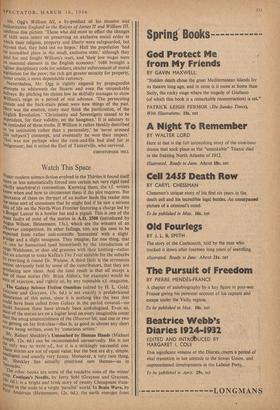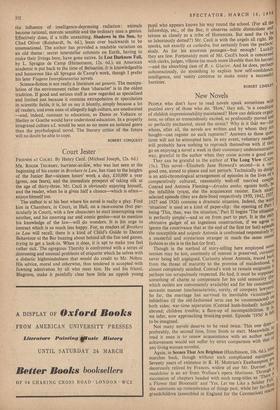Watch This Space
WitLil modern science-fiction evolved in the Thirties it found itself more or less automatically forced into certain not very rigid (and wholly unarbitrary) conventions. Knowing them, the s.f. writers mloW when and how to circumvent them if the plot requires. But Ignorance of them on the•part of an author leads the reader into the same sort of uneasiness that he might feel if he saw a serious ullrl of life on the North-West Frontier featuring a charge led by a Bengal Lancer in a bowler hat and a pigtail. This is one of the Tajo faults of most of the stories in A.D. 2500 (introduced by ,.,'1181.1s Wilson; Heinemann, 15s.), which are the winners of an "bserver competition. Its other failings, too, are the ones to be expected from rather anti-scientific `humanists' with a slight grudge and a slight smugness. They imagine, for one thing, that , can be humanised (and humorised) by the introduction of stge Welshmen, or dear old grannies with their knitting—rather i. nce an attempt to make Kafka's The Trial suitable for the suburbs ,.. 'Y rewriting it round Dr. Watson. A third fault is the erroneous notion obviously held by some of the contributors, that they are roducing new ideas. And the total result is that all except a ,,ew of these stories (Mr. Brian Aldiss's, for example) would be 'ure of rejection, and rightly so, by any reputable s.f. magazine. The Galaxy Science Fiction Omnibus (edited by H. L. Gold: ;'raYson and Grayson, 13s. 6d.) is not exactly a prefabricated illustration of this point, since it is nothing like the best that could have been culled from Galaxy in the period covered—no doubt because those have already been anthologised. Even so, most of the stories are on a higher level on every imaginable count than the smug amateurishness of the Observer lot; and one or two are getting on for first-class—that is, as good as almost any short MarieS being written, even by 'conscious artists.' Mr. Robert Sheckley's UntouChed by Human Hands (Michael ,/s°131), 12s. 6d.) can be recommended unreservedly. His is not the only way to write s.f., but it is a strikingly successful one. These stories are not of equal value, but the best are dry, simple, intelligent and usually very funny. Moreover, a very rare thing,
Sheckley has actually contrived new themes—as in S pecialist.'
The other books arc sonic of the readable ones of the winter crop. Costigan's Needle, by Jerry Sohl (Grayson and Grayson, Us. 6d.), is a bright and brisk story of twenty Chicagoans trans in the nude to a virgin 'parallel' world. In Brain Wave, by uul Anderson (Heinemann, 12s. 6d.), the earth emerges from the influence of intelligence-depressing radiation: animals become rational, morons sensible and the ordinary man a genius. Effectively done, if a trifle unexciting. Shadows in the Sun, by Chad Oliver (Reinhardt, 9s. 6d.), leans over backwards to be unsensational. The author has provided a readable variation on an old theme: secret interstellar colonists on Earth, having to make their livings here, have gone native. In Lest Darkness Fall, by L. Sprague de Camp (Heinemann, 12s. 6d.), an American academic is put back to the time of Belisarius. It is knowledgeable and humorous like all Sprague de Camp's work, though I prefer his later Viagens Inter planetarias novels.
Science-fiction is not really a literature sui generis. The manipu- lation of the environment rather than 'character' is in the oldest tradition. If good and serious stuff is now regarded as specialised and limited just because it contains extrapolation Or speculation in scientific fields, it is, let us say it bluntly, simply because a lot of readers, and even ones of allegedly high culture, are uneducated —and, indeed, resistant to education, as Dante or Voltaire or Shelley or Goethe would have understood education. In a properly integrated culture s.f. would be seen as no more an isolated genre than the psychological novel. The literary critics of the future will no doubt be able to cope.
ROBERT CONQUEST



































 Previous page
Previous page